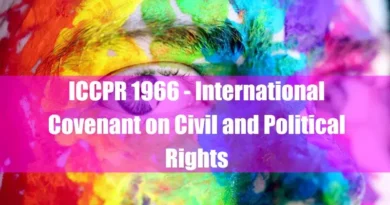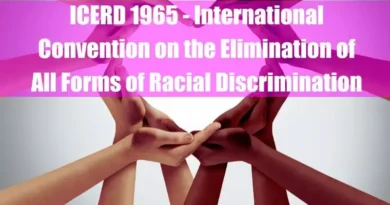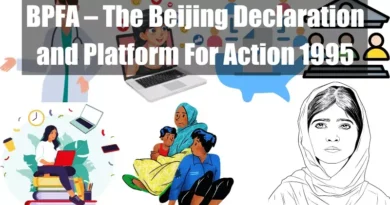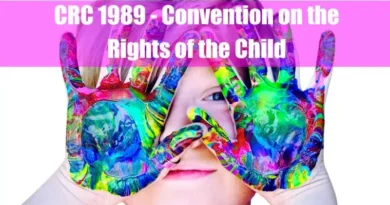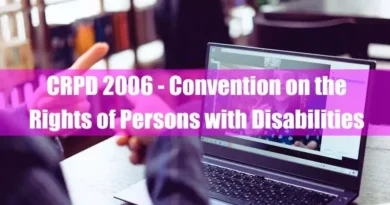CEDAW 1979 – Convention on the Elimination of All Forms of Discrimination Against Women
Takeaways
| Key Points |
|---|
| The 1979 Convention on the Elimination of All Forms of Discrimination Against Women (CEDAW) is a landmark treaty recognizing women’s rights as fundamental human rights and a tool for promoting gender equality across education, employment, health, and political participation. |
| Its 30 articles provide a comprehensive framework, defining discrimination (Article 1), outlining state obligations (Article 2), and guaranteeing equality in law, family life, and public participation (Articles 3-16). |
| CEDAW also mandates measures like temporary special actions to accelerate equality (Article 4), addresses stereotypes (Article 5), and combats trafficking and exploitation (Article 6). |
| Articles 17-30 establish the CEDAW Committee to monitor implementation and include mechanisms for state reporting, dispute resolution, and amendments. |
| Despite its transformative impact, enforcement challenges persist due to the lack of binding sanctions, cultural relativism, and state reservations that limit its reach. |
Introduction
The Convention on the Elimination of All Forms of Discrimination Against Women (CEDAW) 1979 is a vital treaty recognizing women’s rights as fundamental human rights. It is a powerful tool for change, promoting equality and addressing issues like education, employment, health, and political participation.
CEDAW is more than just a legal document; it drives real action by holding countries accountable, ensuring they work towards eliminating gender discrimination, and creating a fairer world for women everywhere.
CEDAW’s Articles:
- Article 1: Defines discrimination against women
- Article 2: Defines State Parties’ obligations to eliminate discrimination
- Article 3: Guarantees the principle of equality
- Article 4: Allows for temporary special measures to accelerate progress towards equality
- Article 5: Calls for States’ Parties to modify social and cultural patterns that perpetuate discrimination
- Article 6: Calls for States Parties to take measures to suppress all traffic in women and exploitation of prostitution of women
- Article 7: Guarantees women the right to vote in all elections and be eligible for election to all publicly elected bodies
- Article 8: Calls for state parties to ensure women’s participation in government policy-making and implementation
- Article 9: Guarantees women equal rights to hold public office and participate in non-governmental organizations.
- Article 10: Guarantees women the right to education on an equal basis with men
- Article 11: Guarantees women the right to work on an equal basis with men, including equal opportunities and equal pay for equal work
- Article 12: Guarantees women access to equal healthcare services on the same conditions as men, including reproductive health services
- Article 13: Guarantees women the right to family benefits on an equal basis with men
- Article 14: Guarantees the rights of rural women to participate in development programs and access adequate living conditions, healthcare, education, and social services
- Article 15: Guarantees women equality before the law, including the rights to enter contracts, own property, and have equal access to legal proceedings
- Article 16: Calls for States Parties to take measures to eliminate all forms of discrimination arising from marriage and family relations
- Article 18: Requires States Parties to submit reports to the CEDAW Committee at least every four years on the legislative, judicial, administrative, and other measures they have adopted to give effect to the provisions of the Convention
- Article 19: Outlines that the CEDAW Committee has the authority to adopt its own rules of procedure for carrying out its functions under the Convention
- Article 20: States that the CEDAW Committee shall normally meet for a period of up to two weeks annually to consider the reports submitted by States Parties
- Article 21: Allows the CEDAW Committee to make general recommendations to States Parties based on examining reports and information received. These recommendations are intended to assist States in fully implementing the Convention
- Article 22: Permits the CEDAW Committee to invite specialized agencies of the United Nations to submit reports on the implementation of the Convention in areas falling within their respective mandates
- Article 24: Reaffirms the commitment of States Parties to adopt all necessary measures at the national level to fully realize the rights recognized in the Convention
- Article 25: Addresses the process for the Convention’s ratification, acceptance, or approval and outlines how it enters into force
- Article 26: Provides a mechanism for amending the Convention, allowing any State Party to propose an amendment
- Article 27: Discusses the settlement of disputes between States Parties regarding the interpretation or application of the Convention
- Article 28: Sets out the conditions under which a State Party may denounce (withdraw from) the Convention.
- Article 29: Clarifies that the original text of the Convention is equally authentic in all six official UN languages and specifies the depositary of the Convention
- Article 30: Addresses the Convention’s application in territories whose international relations are under the responsibility of a State Party
Articles 1-6 – Defining Discrimination and Obligations to Eliminate It

Defining Discrimination Against Women: Article 1
Article 1 establishes a clear definition of discrimination against women. This ensures everyone involved interprets the Convention consistently.
Obligations of State Parties: Article 2
Article 2 outlines countries’ actions to eliminate discrimination against women. This includes revising laws, policies, and social attitudes.
Women’s Empowerment and Development: Article 3
Article 3 takes a broader perspective, emphasizing the importance of achieving women’s full development and advancement. It goes beyond simply eliminating discrimination and aims to create opportunities for women to thrive.
Temporary Special Measures: Article 4
Article 4 addresses concerns about “special measures” favoring women. It clarifies that these measures are not unfair advantages but rather ways to level the playing field. They are temporary actions intended to accelerate progress toward equality for women who may have faced historical disadvantages.
Challenging Social Norms and Stereotypes: Article 5
Article 5 tackles the root causes of discrimination: social norms and stereotypes. It calls for dismantling these rigid expectations about how men and women should behave, allowing individuals greater freedom and removing barriers to equality.
Combating Trafficking and Exploitation: Article 6
Article 6 focuses on protecting women from all forms of exploitation, including trafficking. It signifies a strong commitment to combating these serious violations of women’s rights.
Articles 7-9 – Public Life and Participation
Political Participation and Equality: Article 7
Article 7 guarantees women’s equal rights to participate in political and public life. This includes the right to vote, hold office, and participate in decision-making that affects their communities and societies. It dismantles barriers that might have previously excluded women from these crucial areas.
Women in Government Policy: Article 8
Article 8 ensures women’s voices are heard in shaping government policies. It calls for state parties to actively involve women in the development and implementation of policies across all levels of government. This ensures a more inclusive and representative approach to governance.
Nationality Rights for Women and Families: Article 9
Article 9 addresses the issue of nationality. It guarantees women equal rights with men regarding acquiring, changing, or retaining their nationality. This extends to their children as well, ensuring families are not disadvantaged by outdated nationality laws. The article promotes equal citizenship rights for all.
Articles 10-14 – Education, Employment, Health, and Economic and Social Benefits
Equal Access to Education: Article 10
Article 10 guarantees women’s right to education on an equal basis with men. This ensures girls have the same opportunities as boys to pursue education at all levels, from primary school to university. It removes barriers that might have previously prevented women from achieving their full educational potential.
Equal Rights in Employment: Article 11
Article 11 focuses on ensuring women’s equal rights in the workplace. It guarantees equal opportunities and treatment compared to men, including equal pay for equal work, job security, and maternity leave. This article dismantles discrimination and promotes a workplace where women’s skills and contributions are valued.
Women’s Right to Health: Article 12
Article 12 emphasizes women’s right to access quality healthcare services under the same conditions as men. This includes access to reproductive health services and prioritizes women’s health needs. The article calls for a healthcare system that treats women’s well-being as a critical aspect of their overall well-being.
Economic and Social Benefits for Women: Article 13
Article 13 guarantees women equal access to economic and social benefits. This includes access to bank loans, mortgages, and social security benefits. It empowers women to participate fully in the economic sphere and gives them the resources they need to thrive.
Addressing Discrimination Against Rural Women: Article 14
Article 14 acknowledges the specific challenges faced by women living in rural areas. It calls for state parties to take measures to eliminate discrimination against these women and ensure they have equal access to healthcare, education, and social services. The article recognizes rural women’s vital role in their communities and societies and calls for their needs to be addressed.
Articles 15-30 – Equality Before the Law and in Family Life
Legal Equality for Women: Article 15
Article 15 guarantees women’s right to equality before the law. This ensures women have the same legal rights as men, including signing contracts, owning property, and participating in legal proceedings. It dismantles discriminatory legal practices that might have previously disadvantaged women.
Eliminating Discrimination in Family Matters: Article 16
Article 16 focuses on eliminating discrimination against women in matters relating to marriage and family life. It promotes equal rights and responsibilities for women and men within families. This includes the right to choose a spouse, freely enter into marriage, and control their reproductive choices. The article emphasizes the importance of building families based on equality and partnership.
The CEDAW Committee: A Watchdog for Equality: Article 17
Article 17 establishes the CEDAW Committee, a body of independent experts tasked with monitoring the implementation of the Convention. The Committee reviews reports submitted by state parties and makes recommendations to ensure they uphold their obligations under CEDAW. It acts as a watchdog mechanism, holding countries accountable for their progress towards gender equality.
Functions and Powers of the CEDAW Committee: Articles 18-22
Articles 18-22 define the specific functions and powers of the CEDAW Committee. These include reviewing state reports, conducting inquiries, and making recommendations to address identified gaps or areas where improvement is needed.
The articles also establish procedures for communication and interaction between the Committee and state parties.
Reporting Requirements for State Parties: Articles 23-24
Articles 23-24 reaffirm that the provisions of CEDAW do not affect any more favorable rights or protections that may exist under the laws of State Parties or other international agreements and underscore the general commitments of States to uphold the principles of the Convention.
Concluding Provisions: Articles 25-30
Articles 25-30 cover the concluding provisions of CEDAW. These include details about the Convention’s entry into force, amendments, dispute resolution mechanisms, and the possibility of withdrawal. They ensure the smooth functioning and legal framework for the Convention’s implementation.
The Role of National and International Mechanisms
Monitoring Implementation: The CEDAW Committee
The CEDAW Committee is critical in monitoring state party compliance with the Convention. This committee, composed of independent experts, reviews reports submitted by countries and assesses their progress in achieving gender equality.
They make recommendations and guide states on areas where improvement is needed. The Committee acts as an independent oversight body, ensuring accountability for implementing CEDAW.
State Party Reporting Requirements
State parties under CEDAW must submit regular reports on implementing the Convention. These reports detail the measures they have taken to promote gender equality and their challenges. The reporting process allows for a systematic evaluation of progress and identifies areas where further action is necessary. It fosters transparency and accountability for state parties.
General Recommendations: Guidance for States
The CEDAW Committee issues General Recommendations on specific issues related to women’s rights. These recommendations provide authoritative interpretations of the Convention and offer concrete guidance to states on effectively implementing its provisions.
They address a wide range of topics, from eliminating violence against women to ensuring women’s participation in political and public life. General Recommendations serve as a valuable resource for states in their efforts to achieve gender equality.
Optional Protocol: An Additional Layer of Protection
The Optional Protocol to CEDAW is a legal instrument that allows individuals and groups to petition the CEDAW Committee directly. This mechanism provides an additional layer of protection for women’s rights by allowing them to seek redress for alleged violations of the Convention.
The Optional Protocol strengthens the enforcement capacity of CEDAW and empowers individuals to hold their governments accountable.
Civil Society and NGOs: Key Actors in Advocacy
Civil society organizations (CSOs) and Non-Governmental Organizations (NGOs) are crucial in promoting gender equality. These organizations work at the grassroots level to raise awareness, advocate for policy change, and support women’s rights initiatives.
They serve as a bridge between communities and governments, ensuring that women’s voices are heard and their needs are addressed. CSOs and NGOs are key actors in driving progress towards a more gender-equal world.
Challenges and Critiques of CEDAW
Reservations to CEDAW
States have the right to enter reservations to CEDAW when ratifying the Convention. These reservations express concerns about specific articles or provisions that may conflict with national legislation or cultural norms. While reservations can be a useful tool for encouraging broader state acceptance of the Convention, they can also weaken its impact if they limit the scope of obligations undertaken by states.
It’s important to ensure that reservations are specific, limited in scope, and withdrawn as soon as the underlying reasons are no longer applicable.
Challenges with Enforcement
CEDAW lacks a strong enforcement mechanism. The Committee can only make recommendations and doesn’t have the power to impose sanctions on non-compliant states. Enforcing CEDAW relies on political will, resource allocation, and the commitment of national governments and civil society to hold each other accountable.
Despite these challenges, the Committee plays a crucial role in monitoring progress and identifying areas for improvement.
Cultural Relativism and Gender Equality
Cultural relativism, the idea that cultural practices should be respected, can be a challenge in promoting gender equality. While it’s important to be sensitive to cultural differences, cultural traditions can sometimes be used to justify discriminatory practices against women.
The key is to balance respecting cultural diversity and upholding universal human rights principles enshrined in CEDAW. This requires ongoing dialogue and a shared commitment to achieving gender equality within a multicultural world.
Progress Made and Challenges Remain
CEDAW has undoubtedly been a powerful tool for advancing gender equality worldwide. It has led to significant progress in women’s education, health, and political participation. However, gender equality gaps persist. Violence against women remains a serious problem, and women continue to be underrepresented in leadership positions.
Addressing these ongoing challenges requires sustained efforts by governments, civil society, and international institutions to fully implement CEDAW’s provisions.
FAQ
What is the definition of ‘discrimination against women’ according to CEDAW?
CEDAW defines ‘discrimination against women’ as any distinction, exclusion, or restriction made based on sex that impairs or nullifies women’s recognition, enjoyment, or exercise of human rights and fundamental freedoms in political, economic, social, cultural, civil, or any other field, irrespective of their marital status. This comprehensive definition encompasses direct and indirect forms of discrimination, aiming to address any act perpetuating inequality between men and women.
What does ‘substantive equality’ mean in the context of CEDAW?
‘Substantive equality’ under CEDAW goes beyond formal legal equality to consider the actual conditions of women’s lives. It requires that laws and policies not only be gender-neutral in wording but also ensure that women experience true equality in practice. This approach acknowledges that identical treatment under the law may not suffice to eliminate discrimination if systemic inequalities persist.
What are ‘temporary special measures’ as outlined in CEDAW?
‘Temporary special measures’ refer to targeted actions taken to accelerate de facto equality between men and women. These measures, such as quotas or preferential treatment, are designed to address historical disadvantages women face and are not considered discriminatory. They are intended to be discontinued once the objectives of equality of opportunity and treatment have been achieved.
What is the role of the ‘Committee on the Elimination of Discrimination against Women’?
The Committee on the Elimination of Discrimination against Women is an expert body established under Article 17 of CEDAW. Comprising 23 experts on women’s rights worldwide, the Committee monitors the implementation of the Convention by reviewing reports submitted by States parties and issuing recommendations to ensure compliance with CEDAW’s provisions.
What is the ‘Optional Protocol’ to CEDAW?
The Optional Protocol to CEDAW is a supplementary agreement that allows individuals or groups to submit complaints about violations of rights protected under the Convention. It also enables the Committee to initiate inquiries into situations of grave or systematic violations of women’s rights, thereby strengthening the enforcement mechanisms of CEDAW.
How does CEDAW address ‘gender-based violence’?
While CEDAW does not explicitly mention ‘gender-based violence,’ General Recommendation No. 19, adopted by the Committee, clarifies that gender-based violence is a form of discrimination that seriously inhibits women’s ability to enjoy rights and freedoms on an equal basis with men. This includes acts that inflict physical, mental, or sexual harm or suffering, threats of such acts, coercion, and other deprivations of liberty.
What is meant by ‘intersectionality’ in the context of CEDAW?
‘Intersectionality’ refers to the recognition that women experience discrimination in varying configurations and degrees of intensity based on intersecting identities such as race, ethnicity, religion, age, class, and sexual orientation. CEDAW acknowledges that these intersecting factors can compound discrimination, necessitating a more nuanced approach to achieving substantive equality.
How does CEDAW define ‘trafficking in women’?
CEDAW addresses ‘trafficking in women’ in Article 6, obligating States parties to take all appropriate measures to suppress all forms of trafficking and exploitation of the prostitution of women. This encompasses the recruitment, transportation, transfer, harboring, or receipt of women through threat, force, coercion, abduction, fraud, deception, abuse of power, or giving payments or benefits to achieve the consent of a person having control over another person for the purpose of exploitation.
What are ‘stereotyped roles’ as mentioned in CEDAW?
‘Stereotyped roles’ refer to traditional conceptions of gender roles that assign specific attributes, characteristics, or roles to individuals based solely on their sex. CEDAW obligates States parties to modify social and cultural patterns of conduct to eliminate prejudices and practices based on the idea of the inferiority or superiority of either sex or on stereotyped roles for men and women.
How does CEDAW address ‘rural women’s rights’?
Article 14 of CEDAW focuses on the rights of rural women, recognizing their critical role in the economic survival of their families and communities. It calls on States parties to eliminate discrimination against rural women and ensure they participate in and benefit from rural development, including access to healthcare, education, social security, and adequate living conditions.
What is ‘affirmative action’ in the context of CEDAW?
In the context of CEDAW, ‘affirmative action’ refers to policies and measures designed to correct historical and systemic discrimination against women by providing them with opportunities to achieve substantive equality. These actions are considered temporary and are meant to level the playing field until equal opportunity and treatment are realized.
How does CEDAW define ‘political and public life’ participation?
CEDAW emphasizes women’s equal rights to participate in political and public life, including voting, holding public office, and engaging in non-governmental organizations and associations concerned with public and political life. This ensures that women have the opportunity to influence policy and decision-making processes at all levels.
What are ‘customary practices’ under CEDAW?
‘Customary practices’ refer to traditional, cultural, or religious practices that may perpetuate discrimination against women. CEDAW requires States parties to take appropriate measures to modify or abolish such practices to ensure that cultural norms do not infringe upon women’s rights and equality.




